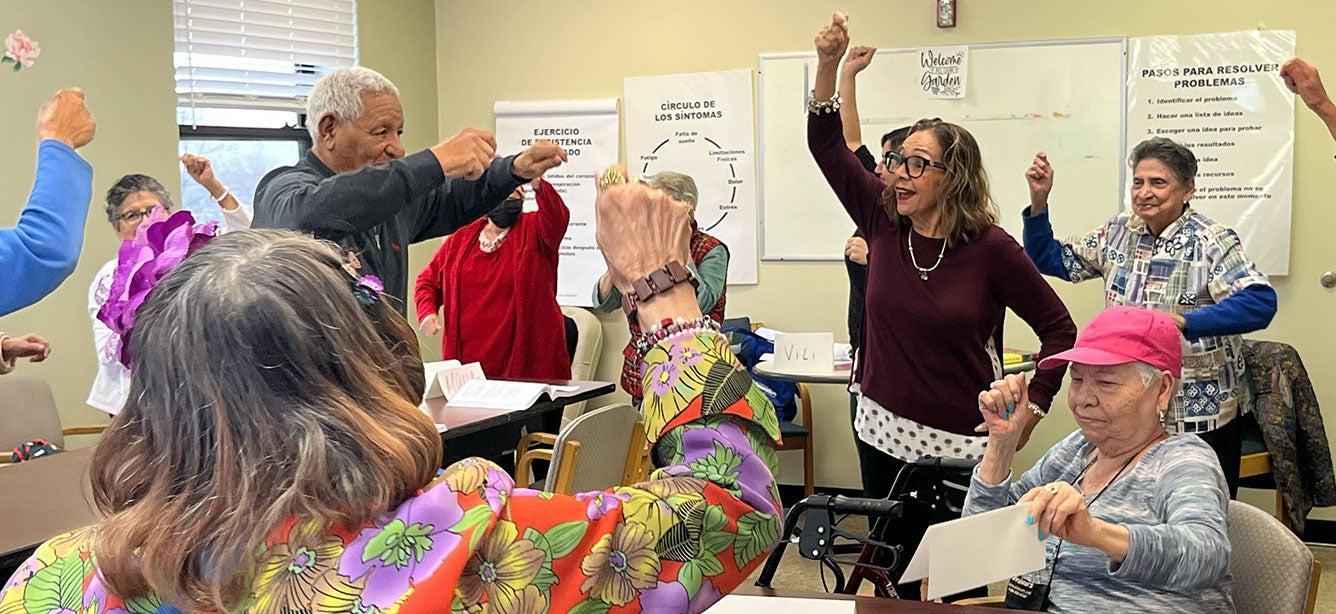
To successfully implement evidence-based programs, it is important to build demand for the programs and establish efficient systems for handling logistics such as marketing, recruitment, enrollment, and retention of participants. Centralizing or coordinating these functions within a state can increase efficiency, improve quality, and help to ensure that consistent messages and approaches are used to reach the target populations.
Don’t reinvent the wheel. Take advantage of existing marketing materials, such as NCOA’s customizable templates for marketing, which includes brochures, posters, and other materials in English and Spanish.
A number of states have implemented strategies to strengthen the marketing and branding of evidence-based programs, including the adoption of statewide program names, use of toll-free numbers, development of websites, and creation of statewide marketing materials.
Guides and toolkits
- Arizona Planning and Marketing Guide
- Wisconsin Marketing Kit: Successfully Promote and Fill Your Diabetes Workshops
Marketing materials
Flyers, posters, and videos are a few of the marketing avenues that you can use to reach your target community by tailoring to your message. Create your own marketing product by following our tips for effective marketing below, or check out some firsthand examples from fellow states.
Tips:
- Include the name of the workshop on the poster.
- List a few skills the participant will learn from the workshop.
- Provide workshop location, address, date, time, class frequency and duration, start date, and cost (if applicable), and instructions on how to sign up.
- Include organization logo, website URL, email address, phone number, and social media handles.
- If there is room, provide a testimony of a previous participant.
- Use visuals to put some color on your product.
Print materials—posters and flyers
- Promotional CDSME Infographic
- Workplace CDSMP Flyer
- “I have diabetes. It doesn’t have me.” Poster
- Matter of Balance Flyer for Participants (National Kidney Foundation of Michigan)
- Matter of Balance Flyer for Participants (Senior Support Program of the Tri-Valley)
Print materials—brochures
- Living Healthy (CDSMP) Brochure
- Tomando Control de su Salud Brochure (Spanish)
- Learn.Move.Live. Brochure
Print materials—other
- Prescription Pad for Evidence-Based Programs
- CDSME fact sheet (with testimonials)
- Opportunities to Stay Engaged After Chronic Disease Self-Management Education
Promotional videos
Other resources
- Sample Press Release: South Dakota Managing Chronic Disease with Better Choices, Better Health Program
- Facebook Ad for Chronic Disease Self-Management Education
Session Zero resources
Some states are conducting a Session Zero to increase the number of people who participate in and complete workshops. Session Zero is an optional pre-workshop session that provides an overview of the program, explains expectations for workshop participation, and secures commitments from participants to aim to complete the program. Some states collect baseline data from participants during Session Zero.1
Tip sheets & scripts
- Tai Chi for Arthritis and Fall Prevention-Instructor Support for Leading A Session Zero
- Session Zero Script for CDSME
- Session Zero Protocol for Balance Days
Also see NCOA’s tip sheet: Increasing Completion of Chronic Disease Self-Management Education Workshops
Centralized websites with marketing and referral tools
Check out the centralized website from the states below to access their marketing and referral tools. You can use these resources in your community or adapt them to fit your target population.
- Massachusetts Online Registration with Make a Referral Button
- New Jersey Marketing Materials
- North Carolina Centralized Website List of tools and templates for marketing CDSME workshops
Caregivers and people with dementia
The physical, emotional, and financial burden that caregiving places on individuals, puts them at risk for developing chronic conditions.2 Evidence-based programs can benefit both the individual who has a chronic condition, as well as the caregiver. Respite funds or supplemental services funds available through Title IIIE of the Older Americans Act can be used to provide care for adults with chronic health conditions, while caregivers attend workshops.
Webinars and presentations
- Chronic Disease Self-Management Programs: Relevance for Persons with Dementia
- Living Well with Chronic Conditions (for caregivers)
- Introduction to CDSME for the Alzheimer’s Association
Adults with disabilities
State and community-based organizations have developed strategic approaches to assure that participants with disabilities are included in evidence-based programming. They serve adults with a variety of disabilities, including low vision and blindness, deafness and hearing loss, intellectual and developmental disabilities, behavioral and mental health conditions, and physical disabilities.3
- Take Charge of Your Health Brochure
- North Carolina’s Chronic Disease Self Management Education: Toolkit for Being Inclusive of Participants with Disabilities
Also see the following NCOA tip sheets:
- Developing Partnerships with the Disability Community
- Engaging People with Disabilities in Evidence-Based Programs
- Resources for Engaging Adults with Disabilities in Evidence-Based Programs
Low literacy
It is difficult to recruit participants who are not confident with their reading level as most of the workshop lessons include reading and writing. Participants may find trouble understanding the learning materials, leading to class absence. Learn how to have your workshops be inclusive of all reading levels by using the resource below.
Communities of color
Communities of color in the U.S. face disproportionate chronic disease burden and disparities related to health care access.4 State- and community-based organizations are working to increase access to and use of evidence-based programs to improve their quality of life and health status.
Specifically, Black and African American communities experience a higer prevalence of chronic diseases such as obesity, heart disease, asthma, and more due to systemic inequities. These chronic conditions can be managed through evidence-based programs, creating opportunities for improved health. Check out these success stories for strategies to implement in your area.
- North Carolina’s Best Practices for Reaching the African-American Faith Community
- Success Stories
- Neighborhood Health Center Reaches Diverse Urban Population with CDSME (page 28)
- Fostering Partnerships through Public Health Region Community Teams in South Carolina (page 72)
- Delivery of CDSMP by Community Health Workers in Subsidized Housing in New Jersey (page 45)
- Increasing Availability and Accessibility of CDSME for Older African Americans in Oklahoma City (page 53)
Outreach to indigenous communities
States who incorporate tribal traditions and activities into the workshop lesson plan are more likely to have high participant engagement and retention among tribal groups. Take a look at the resources and see how these states tailored their workshop for Native American, Alaska Native, and Native Hawaiian participants.
- Description of Washington’s “Wisdom Warriors” Program
- “Wisdom Warriors” Program Brochure
- Also see NCOA’s tip sheet Engaging American Indian/Alaska Native Adults in Chronic Disease Self-Management Education and How to Customize Marketing for Programs in Indigenous Communities
Outreach to Hispanic communities
States are successfully collaborating with a variety of agencies to offer the Tomando Control de su Salud program and Programa de Manejo Personal de la Diabetes, such as the Consortium for Latino Immigration Studies at the University of South Carolina and the Core el Centro in Wisconsin. Individuals who reflect the communities they serve, such as Promotoras and Community Health Workers are effective in recruiting participants and serving as workshop leaders and trainers.
See NCOA’s marketing templates in Spanish.
Rural communities
Rural Americans are more likely to experience heart disease, cancer and overdose on opioids, leading to a low quality of life. Chronic disease self-management and behavioral health programs can help older adults in these communities manage their conditions and overcome addictions. Read the tip sheet to learn strategies for offering evidence-based programs in rural communities.
See NCOA’s tip sheet Offering Chronic Disease Self-Management Education in Rural Areas.
Veterans
Veterans are a vulnerable population as they experience health disparities include depression, post-traumatic stress disorder, anxiety, and substance abuse.
Community-based organizations strive to reach Veterans in their area to offer chronic disease self-management and behavioral health programs to better manage their health conditions. Read more to learn how to engage aging Veterans in evidence-based programs.
View NCOA’s tip sheet Engaging Veterans in Evidence-Based Programs.
Sources
1. Jiang L, et al. The role of Session Zero in successful completion of Chronic Disease Self-Management Program workshops. Frontiers in Public Health. April 2015. Found on the internet at https://pubmed.ncbi.nlm.nih.gov/25964918/
2. Robert Wood Johnson Foundation and Johns Hopkins Bloomberg School of Public Health. Chronic Care: Making the Case for Ongoing Care. 2010. Found on the internet at https://publichealth.jhu.edu/sites/default/files/2023-04/jhdaai-chartbook-2010.pdf
3. NCOA. Creating Greater Access to Chronic Disease Self-Management Education for People with Disabilities. Found on the internet at https://www.noa.org/article/chronic-disease-self-management-education-and-people-with-disabilities-successful-practices
4. Boutaugh, ML, Jenkins, SM, et al. Closing the Disparity Gap: the Work of the Administration on Aging. Journal of the American Society on Aging. Winter 2014-2015. Found on the internet at https://www.jstor.org/stable/26556090



